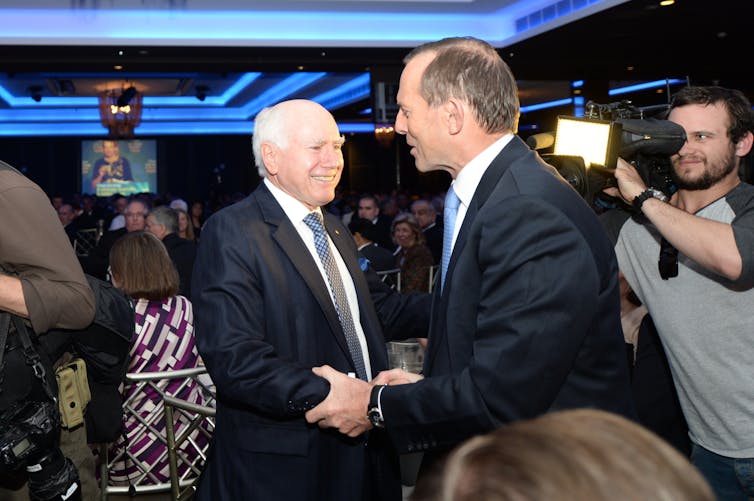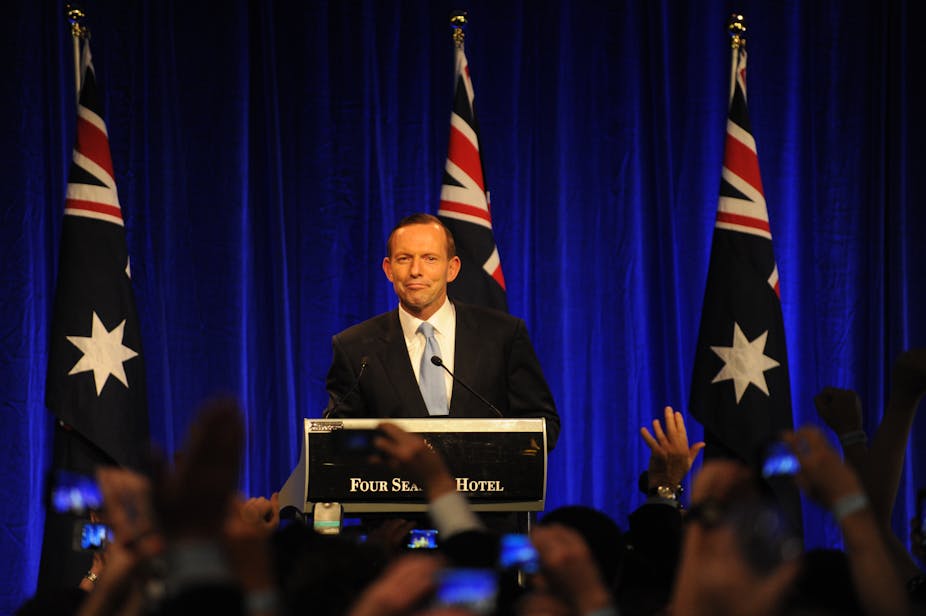Not so long ago, Tony Abbott looked washed up. In 2007, while other ministers wanted to replace John Howard as the captain of the Coalition’s sinking ship, Abbott stood resolutely by his political hero all the way to a humiliating election defeat.
Abbott had been in a funk as the Liberals’ fortunes soured. He publicly questioned the ethics of a dying man, Bernie Banton, and during the election campaign he turned up embarrassingly late to a televised debate.
In the days after that defeat, Abbott sought to succeed Howard as Liberal leader, citing what he called his people skills as one of his strengths. This ended badly too: when he realised his party room numbers were derisory, he withdrew his candidacy and went off to write a book as a way of salving his political pain.
The political caravan, it seemed, had taken off without Abbott.
But no: now he is our prime minister.
The man to whom the ironic appellation “people skills” was attached during those lean times joins Sir Robert Menzies, Malcolm Fraser and Howard as the only Liberal leaders to have vanquished a Labor government.
Vindication is his, but there is still the small matter of actually doing the job now that he has secured it. Abbott as an opposition leader was frenzied, intense, relentless, functionally incapable of pulling back and changing either his tone or his rhetoric.
From the first moment Abbott took on the leadership in December 2009, he sought power through aggression and the creation of an ever-heightening sense of crisis in the polity and the economy. His twin objectives were to instigate the overthrow, either through parliamentary or electoral means, of a Labor government that he had from the start viewed as illegitimate, the product of nothing more than a reflexive “It’s Time” sentiment among voters in 2007 that the Howard government had had long enough.
“Campaign in poetry and govern in prose” the saying goes. Abbott all the way through campaigned in spray can graffiti.
But it worked. Abbott, a journalist early in his adult life, made an astute judgement about the changing nature of the Australian electorate. He understood, and continues to understand, that increasing numbers of voters feel no fidelity to any party, do not care about politics, do not pay attention to the news and that their only interest in policy is how it might affect them. The key word in that last element is “might”.
Having lived without the economic hardships that come from a recession for more than 20 years, the metrics by which Australians judge that they are, as the political cliché has it, “doing it tough” – that is, feeling cost of living pressures - have shifted dramatically. Ever-greater swathes of the electorate are convinced that they are economically deprived, even though inflation is under control, the economy continues to grow and unemployment is close to modern historical norms.
Many contemporary voters, untethered from any political convictions of their own, are highly suggestible and Abbott’s campaigns on Labor’s carbon pricing and economic management exploited this to the hilt.
Now that they are in charge, Abbott and his likely treasurer Joe Hockey will have to transform their political approach instantaneously. The hysterics of the past few years will no longer be of use to them.
In the final week of the campaign, they worked assiduously to recast their economic program. Having spent their time in opposition asserting that the nation’s finances were in a critical state and that there was a budget emergency, they finished up subscribing pretty much to the budget settings of Labor’s outgoing treasurer Chris Bowen.
Depending on one’s point of view, this demonstrates either a breathtaking capacity for cynicism or a masterful deployment of political agility.
In any event, it points to a pragmatism that has regularly been at the heart of Abbott’s political modus operandi and which is likely to drive him as prime minister. Abbott is a conservative in the conventional sense. That is, he opposes change with a genuine conviction - until change becomes irresistible. And then he embraces that new order.

As Howard’s health minister, he sought to fashion the Coalition as “the best friend Medicare has ever had”, conveniently ignoring the fact that the Whitlam and Hawke governments had to shed much political blood to implement the policy after years of political opposition from the Liberals. Even so, when he saw how it worked, Abbott embraced it.
A related process has been at play under his leadership, as he has adopted some of Labor’s best policy ideas, with adjustments. His government will see through four of the six years of the Gonski school funding. It will implement a National Broadband Network, but a weaker, cheaper version. It will continue on with the National Disability Insurance Scheme, but wants to drop Labor’s name for it, DisabilityCare.
A key policy on which the Abbott government will not yield is a market pricing mechanism for carbon emissions. The reason for this is mostly to do with the internal politics of the broader Liberal movement and only a little to do with ideology.
Abbott himself is ambivalent on the theory of man-made climate change. He came to the leadership in late 2009 on a pledge of killing an emissions trading scheme because he judged that the climate change question was splitting both the Liberal Party and its supporter base.
Hence he will oversee Direct Action, an inefficient, costly policy that aspires to cut emissions and placates his backers who believe climate change is real. And at the same time, by killing the carbon tax he will appease the large proportion of Liberals who think climate change is hokum. It could be said to be a classical Liberal political solution.
Will there be any great policy initiatives under prime minister Abbott? Workplace relations is the standout issue. Abbott argued unsuccessfully against WorkChoices inside the Howard cabinet and he has done what he can to stave off the powerful forces inside his party and the business community to revive the key elements of that policy regime – at least until he took office.
But the pressures are immense to once and for all crush Australia’s already weakened union movement, a vital political resource for the ALP. In this term, there will be plenty of softening up of the electorate: inquiries into union corruption and productivity bottlenecks. Expect to hear a lot about how much unions are holding back the Australian economy in the next three years and how much has to be done to put them back in their box.
With the demise of the Rudd government, the historical comparisons with the Whitlam era become stronger: only two terms of office, plenty of political dysfunction, some powerful policies but also a degree of chaos. It is up to Abbott to ensure that the second act of the Whitlam drama is not repeated.
With Labor harassed into destruction, the Coalition government that replaces it is unclear on what exactly it wants to do in power beyond keeping its hand on the tiller, having returned the nation to its rightful place - the conservative bosom.

